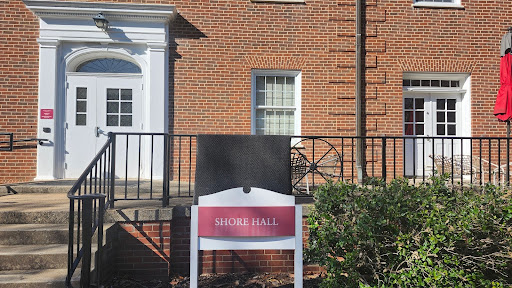Is Guilford’s judicial system discouraging victims of sexual misconduct from pressing charges? According to sophomore Cara Messina, they are — and she has the firsthand experience to prove it.
At Guilford Pride’s Drag Ball on April 27, 2013, Messina, along with another student, was groped by a student who was a senior at the time.
“He was very drunk,” said Messina. “He approached us and asked us if we wanted to get wasted.”
After declining his invitation, the girls were followed around by the alleged offender as they cleaned up from the night’s activities.
“He wouldn’t leave us alone,” said Messina. “He repeatedly touched me, and after asking him to stop he apologized and walked away.”
But then he came back.
“He touched me in inappropriate places,” said Messina. “After that, he followed my friend into the girl’s bathroom and I called Public Safety.”
The next day, the girls put matters into the hands of the judicial process. But according to Messina they were dissuaded from pressing charges.
“There was the option, but it was not encouraged,” said Messina. “There was no eagerness to punish him for his actions.”
The offender wrote an apology letter and offered to meet the girls in person to give a more personal apology. The girls declined his offer.
They were told he felt really bad and that the apology letter should be enough.
The alleged offender’s graduation status was also brought up in the conversation. He was set to graduate in a few weeks, and if found guilty of the charges, would have likely been suspended.
“(We were told), ‘Don’t press charges; we wouldn’t want to ruin his chances for graduation,’” said Messina. “There was a strong sense for us to be compliant.”
With all the pressure from the administration, Messina ultimately decided not to press charges. The offender was, however, sanctioned with sexual misconduct.
The administration was unable to comment on the issue due to privacy laws.
Janet MacDonald ‘13 also felt let down by the judicial system when she reported an incident last March.
After engaging in sexual acts with two Guilford students one night in a state where she was unable to give consent, MacDonald wanted to press charges.
“I wanted to let guys know that they couldn’t just take advantage of a girl when she’s black-out drunk and think that nothing will happen to them and that it isn’t rape — because it is,” said MacDonald.
Although the administration provided counseling support for her, MacDonald felt her offenders were let off the hook. One of the students was found guilty of “intent to rape”, even though he admitted to having sex with her.
“They didn’t let me get justice and set a good example,” said MacDonald. “This guy still got to graduate. He sat one row behind and three seats over from me at graduation, which was just a physical reminder that this guy has gotten to skate by and never faced consequences, while I struggled to make sure I got my work done amidst everything so I could graduate.”
It is important to improve the process of reporting incidents like these, which are common on college campuses.
“Students realize something is wrong with the process,” said junior and member of Sexual Assault Awareness Support and Advocacy Chelsea Yarborough “There are statistics available but they are likely underreported or incorrectly filed. The numbers could be easily skewed.”
According to Yarborough, it is very difficult to report a sexual misconduct incident.
“The reporting form is very difficult to find,” said Yarborough. “Why isn’t it on the front page of the website? It has the local weather but no sexual misconduct resources.”
Even if it were easier to report, Yarborough thinks pressing charges is not encouraged enough.
“Victims are not pushed to press charges formally,” said Yarborough.
Messina and MacDonald certainly felt this way after they came forward.
Incidents like these are particularly important to discuss considering Guilford’s recent launch of its new consent-based sex campaign, “Keep It Consensual: Only Yes Means Yes.”
While Messina and MacDonald’s experiences may not have aligned with the campaign’s goals, the administration welcomes student input to create a better process.
“If students are ever dissatisfied with the judicial process, they should come see us to talk about their concerns,” said Vice President for Student Affairs and Dean of Students Aaron Fetrow.
“Students can also get involved with the Community Accountability Process, the Judicial Board and the Senate Judicial Committee.”
The administration encourages open discourse about this tricky, but crucial, subject matter.
“With the ‘Keep It Consensual’ campaign, this year was about these discussions,” said Fetrow. “We wanted them to start and want them to continue.”











